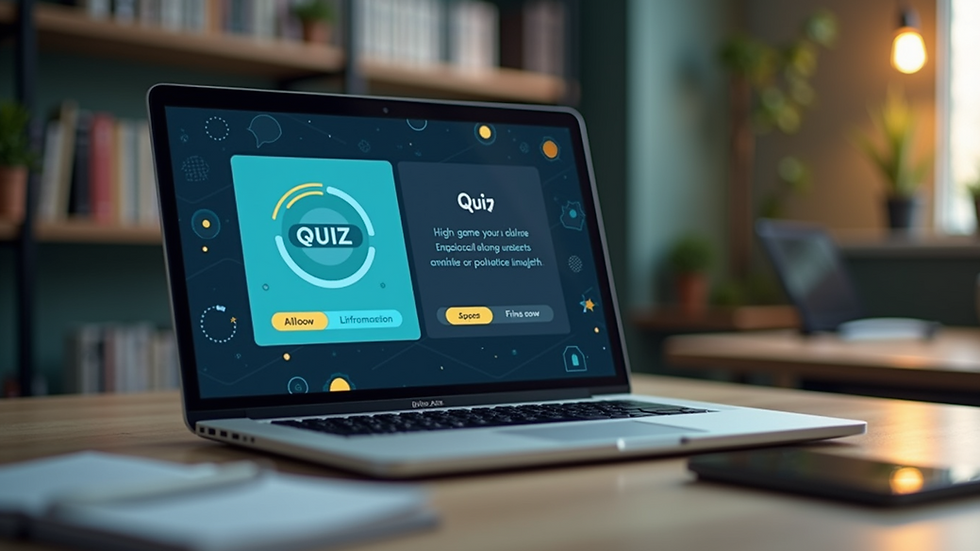How Quizzes Promote Learning Across the Country
- MAV 404
- May 30
- 4 min read
Quizzes have become a key tool in the education sector, playing an essential role in both classroom settings and online learning environments. With the advent of technology, the range and effectiveness of quizzes have expanded significantly. This post explores how learning quizzes promote education across the nation, helping students of all ages enhance their knowledge retention and problem-solving skills.
The Role of Learning Quizzes in Education
Learning quizzes serve as a powerful educational tool for engaging students. Research shows that quizzes not only assess knowledge but also reinforce the material learned. By testing what they have already studied, learners can identify gaps in their understanding and improve their knowledge base. For example, studies indicate that students who take quizzes on the material immediately after learning perform better in subsequent tests.

Furthermore, in educational settings, instructors can use quizzes to tailor their teaching strategies. By analyzing quiz results, teachers get insights into the areas where students might struggle, allowing them to adjust their lesson plans accordingly. This adaptive learning model helps to ensure that every student gets the attention they need, making education more personalized.
Benefits of Learning Quizzes
The benefits of incorporating quizzes into learning are extensive. First and foremost, they promote active learning. This form of learning engages students by encouraging them to think critically and apply their knowledge, rather than passively absorbing information.
Additionally, quizzes can significantly enhance memory retention. According to cognitive psychology, the act of retrieving information strengthens neural connections, making it easier to recall that information later. A quiz serves as a study tool from which learners can benefit, reinforcing their understanding of the material over time.

Moreover, quizzes help to build confidence among learners. As students successfully answer quiz questions, they progressively gain assurance in their knowledge and skills. This self-confidence fosters a positive learning environment where students feel encouraged to participate more actively.
Engaging a Diverse Audience through Quizzes
One remarkable aspect of learning quizzes is their ability to engage diverse audiences. Quizzes can cater to various educational levels and age groups, from elementary school students to adult learners in professional development courses. This flexibility makes quizzes an inclusive tool for promoting knowledge acquisition.
For instance, platforms offering online quizzes often allow for varying levels of difficulty. This means that learners can progress at their own pace, which is particularly beneficial for adult learners who may be balancing education with other responsibilities, such as work or family.
Moreover, quizzes can be themed around current events or popular culture to capture the interest of learners. This kind of engagement not only makes learning fun but also relevant to students’ lives. A quiz based on a nationwide quiz phenomenon can spark interest in various academic subjects, encouraging learners to explore topics they may not have engaged with otherwise.
The Impact of Technology on Learning Quizzes
Technology has revolutionized how quizzes are designed and administered. Many educational platforms now provide interactive quizzes that offer instant feedback, allowing students to learn from their mistakes while reinforcing correct answers. This immediacy is crucial for effective learning, as it helps cement information in students' minds.
Additionally, gamification is becoming a popular trend in quiz-based learning. By incorporating game-like elements such as points, badges, and leaderboards, educational platforms can motivate students to participate actively. For example, educational apps often provide quizzes in a game format, encouraging friendly competition among peers. This engaging method not only promotes enthusiasm but also enhances retention and understanding of the subject matter.

Moreover, with the rise of remote learning, quizzes can now reach learners in different geographic locations. This adaptability contributes to a more inclusive educational framework, allowing access to quality resources regardless of location. Whether in a rural town or an urban center, students can take advantage of the same educational opportunities through online quizzes.
Actionable Recommendations for Implementing Quizzes
To maximize the benefits of learning quizzes, educators and institutions should consider the following actionable recommendations:
Integrate Quizzes Regularly: Use quizzes not just as assessments, but as learning tools. Incorporate them regularly into lesson plans.
Provide Instant Feedback: Offer immediate feedback on quiz results to reinforce learning and enhance understanding.
Diversify Question Types: Use various question formats such as multiple-choice, true/false, and open-ended questions to cater to different learning styles.
Promote Collaboration: Encourage group quizzes or peer discussions after quizzes so students can learn collaboratively.
Monitor Progress: Utilize quiz results to track student progress over time. This data can help identify areas needing additional focus.
By following these guidelines, educators can create an effective learning environment that not only engages students but also empowers them to succeed academically.
Embracing the Future of Learning Quizzes
As we look towards the future, it is clear that quizzes will play an increasingly vital role in promoting learning across the country. With ongoing advancements in technology, the effectiveness of quizzes as an educational tool will only continue to grow.
A nationwide quiz competition could be a fantastic catalyst for fostering interest in various subjects, encouraging learners to engage with content on a more profound level. Festivals, community events, and schools can embrace this opportunity to unite students in a fun, competitive environment focused on learning.
By harnessing the potential of quizzes and remaining adaptable to new trends, we can ensure that education remains accessible, engaging, and effective for all learners. Quizzes are not just a testing tool; they are paving the way for a brighter, more educated future for students nationwide.

Comments